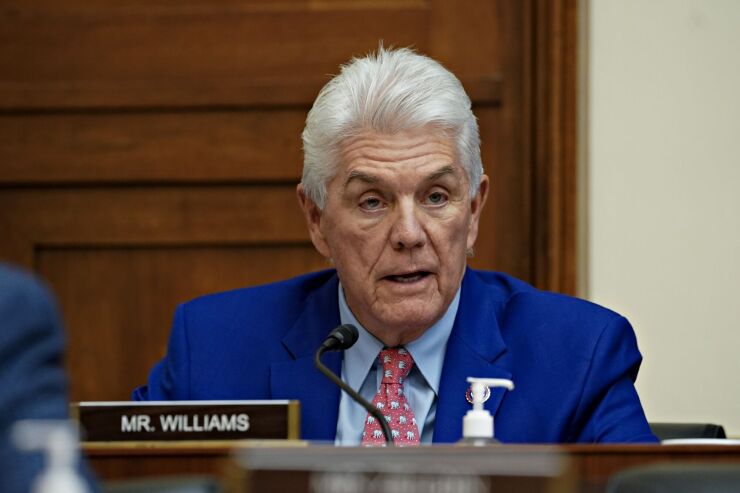
Nearly three years after a consultant first suggested the possibility, the Small Business Administration has nixed the idea of selling any part of its huge COVID-19 EIDL portfolio.
Given the longer duration of the EIDL portfolio — EIDL stands for economic injury disaster loan — the decision means SBA will likely shoulder a significantly increased servicing burden for years as the portfolio, whose size was estimated at $273 billion last month, winds down.
SBA established a servicing center in Fort Worth, Texas, last year to handle EIDL servicing chores. SBA is on track to spend $347.3 million servicing EIDL loans in the current 2024 fiscal year, according to its fiscal 2025 budget justification. It requested another $344 million in fiscal 2025, which starts Oct. 1. That makes EIDL by far SBA's costliest portfolio in terms of servicing.
SBA requested $44.1 million to service its regular disaster relief loan portfolio in fiscal 2025. Servicing the $35 billion 7(a) loan guarantee program, SBA's largest regular program in which more than 1,000 banks and credit unions participate, is expected to cost $6.4 million in fiscal 2024 and $6.8 million in fiscal 2025.
In a letter Wednesday to House Small Business Committee Chairman Roger Williams, George Holman, the agency's associate administrator for congressional and legislative affairs, stated the government would net considerably more money retaining EIDL loans than it would receive by selling them. "Because the COVID EIDL portfolio would be sold for a fraction of the value according to best estimates, taxpayers would bear the entirety of that cost," Holman wrote. He added that an "optimistic estimate" of what the agency could get by selling the loans was $82 billion to $164 billion.
Williams criticized the agency's handling of the issue, claiming SBA might have received a bigger return if it opted to sell after receiving the consultant's recommendation to take this step in September 2021. "I am extremely disappointed in the SBA for failing to sell off the EIDL portfolio as advised," Williams said Wednesday in a press release.
Williams added that SBA has failed to provide lawmakers with an internal analysis or justification of its decision despite repeated requests. Last week, during a Small Business Committee hearing, Williams said that the SBA has "repeatedly stonewalled" requests for documents. He repeated that theme Wednesday. "This is an unacceptable refusal to cooperate with Congressional oversight that has become routine under Administrator [Isabel Casillas] Guzman's leadership," Williams said in the press release.
The disagreement over disposition of the EIDL portfolio is the latest instance of loggerheads between lawmakers and the SBA. Williams and his Republican colleagues have blasted Guzman's plans to
Unlike the larger, forgivable Paycheck Protection Program, the COVID economic injury disaster loans carry a maximum duration of 30 years. They must also be repaid in full. SBA made 3.9 million EIDL loans for $378.4 billion between March 2020 and May 2022, when program funds were exhausted.
In another key difference with the $800 billion PPP, SBA made EIDL loans directly to borrowers. Banks, credit unions and other private-sector lenders made PPP loans which were guaranteed by SBA. As of October 2022, the agency had forgiven about 10.5 million PPP loans totaling $756 billion.
SBA has struggled with EIDL collections. Under the original loan terms, repayment was scheduled to begin 12 months from the date of the original note. SBA extended the deferment period twice, the second time to 30 months. Subsequent collection efforts hit another snag when it was revealed SBA planned to halt collection activities on delinquent EIDL loans of $100,000 or less. SBA figured the process' cost would outweigh any recoveries, but its logic was challenged by lawmakers and SBA's Office of the Inspector General. SBA reversed course in December.
Katie Frost, the agency's associate administrator for capital access, testified last week that the about-face came only after data showed small-dollar loans could be recouped in a cost-effective manner. "The initial analysis that was conducted on the collectability of these small-dollar loans was conducted in early 2022, actually before repayment had even started," Frost said. "It was modeling, based on projections. … The latest analysis, in December of last year, showed that it was likely going to be cost effective if we took that final collection step of referring [loans]" to the Department of the Treasury.
"The SBA is not equipped, nor should they service a $379 billion loan portfolio for 30 years," Matt VanHyfte, the Small Business Committee's communications director, wrote Friday in an email to American Banker. "The SBA does not have the expertise or resources. … Anyone who has dealt with the federal government knows they aren't in the customer service business."
However, SBA's track record of selling loans is also less than stellar, according to Holman. The most recent sales, in the early 2000s, resulted in losses of nearly $1 billion, Holman wrote in his Wednesday letter.






